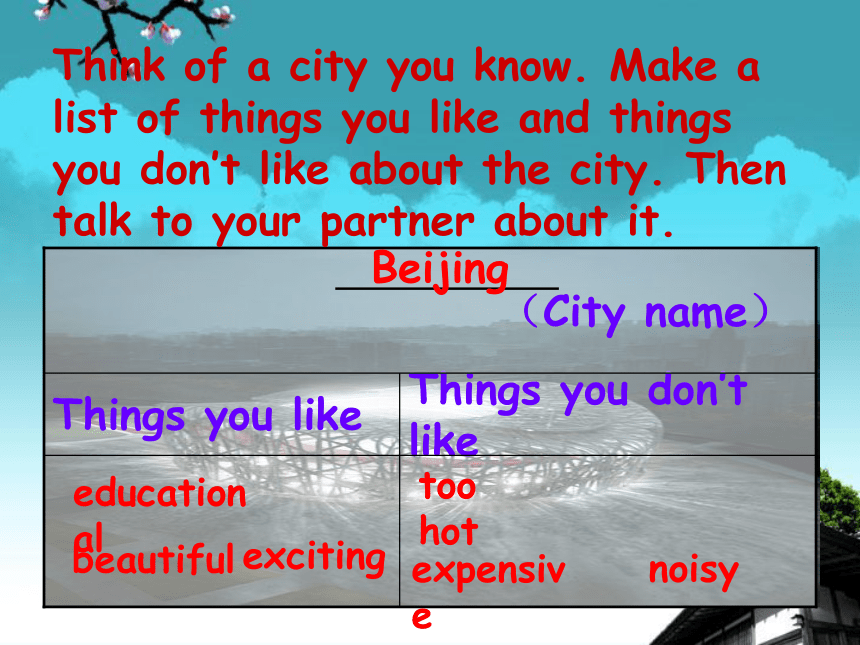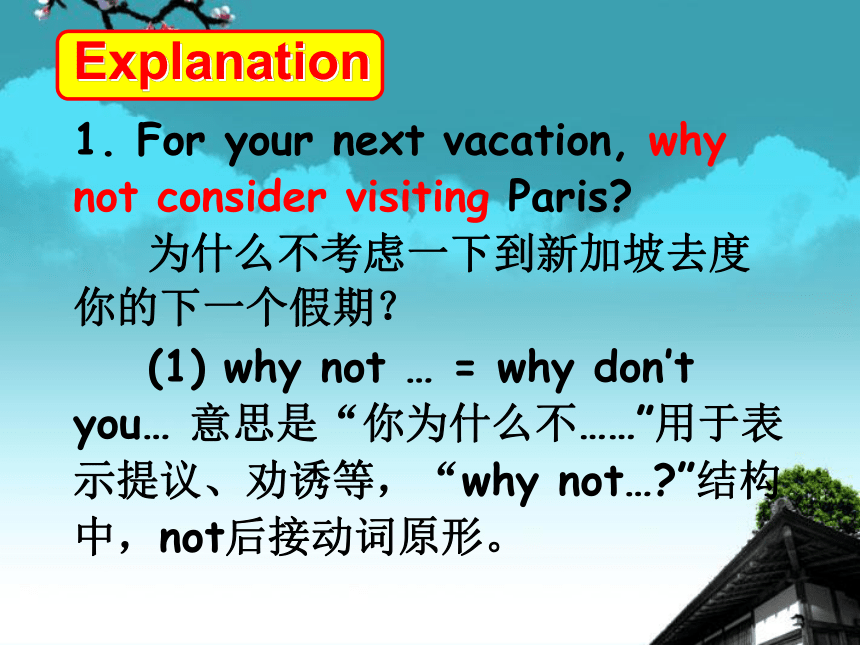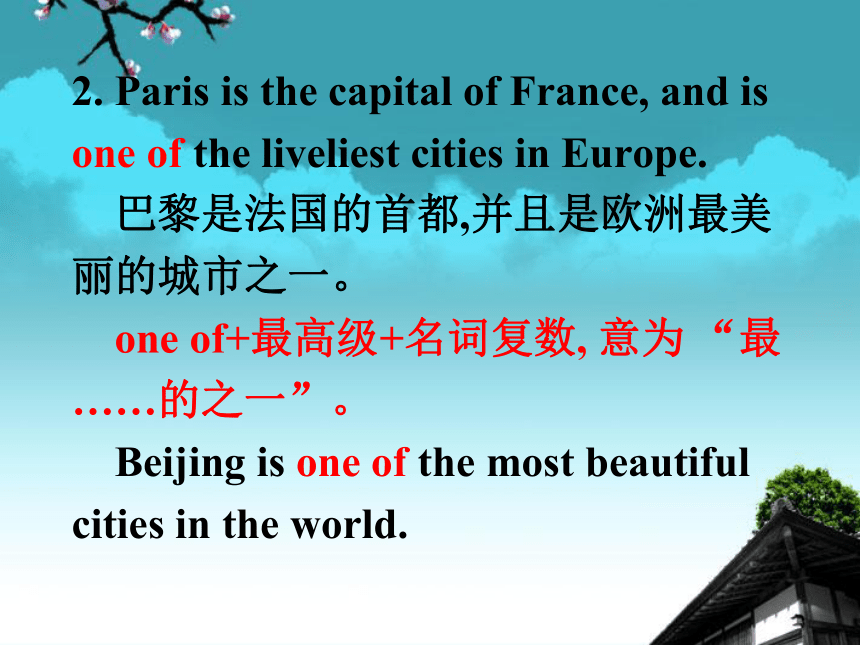(沪教牛津版)一年级英语上册课件 Unit 9(13)
文档属性
| 名称 | (沪教牛津版)一年级英语上册课件 Unit 9(13) |

|
|
| 格式 | zip | ||
| 文件大小 | 110.7KB | ||
| 资源类型 | 教案 | ||
| 版本资源 | 上海牛津(绿色上教版) | ||
| 科目 | 英语 | ||
| 更新时间 | 2013-02-23 17:01:43 | ||
图片预览







文档简介
课件18张PPT。Think of a city you know. Make a list of things you like and things you don’t like about the city. Then talk to your partner about it.Beijingbeautifuleducationalexcitingexpensivenoisytoo hot1. For your next vacation, why not consider visiting Paris?
为什么不考虑一下到新加坡去度你的下一个假期?
(1) why not … = why don’t you… 意思是“你为什么不……”用于表示提议、劝诱等,“why not…?”结构中,not后接动词原形。Explanation e. g. Why not come and see me tomorrow?
= Why don’t you come and see me
tomorrow?
明天来找我怎么样?
(2) consider是动词,意为“仔细考虑,深思熟虑”,后面可接名词、从句、副词,接动词时要用v-ing形式。
e.g. We considered his suggestion.
我们仔细考虑了他的建议。 He is considering studying abroad.
他正在考虑出国留学。
We considered how we should help them.
我们仔细考虑应该如何帮助他们。
Consider carefully before you decide.
你要慎重考虑后再决定。 (3) 句中的 visit 是动词, visit 还可作名词。
<1> visit作动词时, 既可作及物动词, 也可作不及物动词, 表 “访问, 拜访, 探望”。
e. g.
I’m going to visit my uncle tomorrow.
我打算明天去看望我叔叔。 <2> visit 作名词时,意为 “访问,参观,观光”。后接介词to短语时,表示 “在某处的访问(观光)”。
e. g.
This is my first visit to Sweden.
这是我第一次到瑞典游览。 2. Paris is the capital of France, and is one of the liveliest cities in Europe.
巴黎是法国的首都,并且是欧洲最美
丽的城市之一。
one of+最高级+名词复数, 意为 “最……的之一”。
Beijing is one of the most beautiful cities in the world. 3. Traveling around Paris by taxi can cost a lot of money.
乘出租车游巴黎会花掉一大笔钱。
cost指东西值多少钱,主语一般是所买的东西等名词。 Spend 主语是人, take 主语是物或是 it 做形式主语, cost 主语是物。
1) spend的主语必须是“人”,宾语可以是钱,精力,时间等,其后用on (for) +名词或用 in (可省略) +动名词形式,不接不定式。e. g.
He spent a lot of money for his new car. He spends much money on books.
Mr. Li spends a lot of time (in) helping his students with their English.
2) take可用于表示花时间、金钱、勇气等。e. g.
It took the workers three years to
build the bridge. 建这座桥花了工人们三年的时间。 3) cost可用于表示花时间和金钱, 其主语一般是“物”或“事”, 表示“耗费”。
e. g.
The book costs him one dollar.
这本书用了他一美元。
Homework costs the children much time.
家庭作业要花孩子们许多时间。 4. So unless you speak French yourself,
it’s best to travel with someone who can
translate things for you.
所以除非你本人说法语, 最好和一个
能替你翻译法语的人一起来巴黎旅游。
unless 除非……, 引导条件状语从句。
比 “if…not” 略微正式。表示意愿和愿意的常用表达 在表达主体意愿的句型中,最常用的即:would like, would love, want, prefer, wish hope等。
1. would like to do sth/would like sb to do sth
(1)like后面接动词不定式,表示“愿望,喜爱”,常用于有礼貌地提出邀请、请求或建议。
e.g. I would like to drop maths.
Would you like to come to supper?(2)当主语是第一人称时, would可与should 换用,
它们都可以缩写为’d , 并且 like也可换成 love.
e.g. I’m sure he would love to come. I should like the red one.
(3) would like 后面可以用动词不定式作宾语
补足语。
e.g. --What would you like me to do? -- I’d like you to meet my parents, too. (4)would like to do句式的疑问式将would 提到主语前。在回答时,可省略to后面相同的部分。例如:
--Would you like to go with me?
--I’d like/love to.
--Would you like to join us?
--I’d like/love to. But I have no time.点拨
would like 后面接名词或代词做宾语时一般疑问句
的答语:肯定回答一般用Yes, please. 否定回答一般
用 No, thanks. 例如:
--Would you like a cup of tea?
--Yes, please.
--Would you like something to eat?
--No, thanks.Tips: would like与like不同,后面不能用动词
的现在分词,也就是说,后面不能加V+ing形式.
并且,would like没有人称和数的变化,would
love与 would like用法基本相同。2. want 的用法
want, 意为 “想要”, 表达说话者对某事或某物
的需要及希望。其具体用法如下:
(1) 后面接名词或代词,表示“想要”某样东西。
e.g. I want the red dress skirt on the shop’s
window.
为什么不考虑一下到新加坡去度你的下一个假期?
(1) why not … = why don’t you… 意思是“你为什么不……”用于表示提议、劝诱等,“why not…?”结构中,not后接动词原形。Explanation e. g. Why not come and see me tomorrow?
= Why don’t you come and see me
tomorrow?
明天来找我怎么样?
(2) consider是动词,意为“仔细考虑,深思熟虑”,后面可接名词、从句、副词,接动词时要用v-ing形式。
e.g. We considered his suggestion.
我们仔细考虑了他的建议。 He is considering studying abroad.
他正在考虑出国留学。
We considered how we should help them.
我们仔细考虑应该如何帮助他们。
Consider carefully before you decide.
你要慎重考虑后再决定。 (3) 句中的 visit 是动词, visit 还可作名词。
<1> visit作动词时, 既可作及物动词, 也可作不及物动词, 表 “访问, 拜访, 探望”。
e. g.
I’m going to visit my uncle tomorrow.
我打算明天去看望我叔叔。 <2> visit 作名词时,意为 “访问,参观,观光”。后接介词to短语时,表示 “在某处的访问(观光)”。
e. g.
This is my first visit to Sweden.
这是我第一次到瑞典游览。 2. Paris is the capital of France, and is one of the liveliest cities in Europe.
巴黎是法国的首都,并且是欧洲最美
丽的城市之一。
one of+最高级+名词复数, 意为 “最……的之一”。
Beijing is one of the most beautiful cities in the world. 3. Traveling around Paris by taxi can cost a lot of money.
乘出租车游巴黎会花掉一大笔钱。
cost指东西值多少钱,主语一般是所买的东西等名词。 Spend 主语是人, take 主语是物或是 it 做形式主语, cost 主语是物。
1) spend的主语必须是“人”,宾语可以是钱,精力,时间等,其后用on (for) +名词或用 in (可省略) +动名词形式,不接不定式。e. g.
He spent a lot of money for his new car. He spends much money on books.
Mr. Li spends a lot of time (in) helping his students with their English.
2) take可用于表示花时间、金钱、勇气等。e. g.
It took the workers three years to
build the bridge. 建这座桥花了工人们三年的时间。 3) cost可用于表示花时间和金钱, 其主语一般是“物”或“事”, 表示“耗费”。
e. g.
The book costs him one dollar.
这本书用了他一美元。
Homework costs the children much time.
家庭作业要花孩子们许多时间。 4. So unless you speak French yourself,
it’s best to travel with someone who can
translate things for you.
所以除非你本人说法语, 最好和一个
能替你翻译法语的人一起来巴黎旅游。
unless 除非……, 引导条件状语从句。
比 “if…not” 略微正式。表示意愿和愿意的常用表达 在表达主体意愿的句型中,最常用的即:would like, would love, want, prefer, wish hope等。
1. would like to do sth/would like sb to do sth
(1)like后面接动词不定式,表示“愿望,喜爱”,常用于有礼貌地提出邀请、请求或建议。
e.g. I would like to drop maths.
Would you like to come to supper?(2)当主语是第一人称时, would可与should 换用,
它们都可以缩写为’d , 并且 like也可换成 love.
e.g. I’m sure he would love to come. I should like the red one.
(3) would like 后面可以用动词不定式作宾语
补足语。
e.g. --What would you like me to do? -- I’d like you to meet my parents, too. (4)would like to do句式的疑问式将would 提到主语前。在回答时,可省略to后面相同的部分。例如:
--Would you like to go with me?
--I’d like/love to.
--Would you like to join us?
--I’d like/love to. But I have no time.点拨
would like 后面接名词或代词做宾语时一般疑问句
的答语:肯定回答一般用Yes, please. 否定回答一般
用 No, thanks. 例如:
--Would you like a cup of tea?
--Yes, please.
--Would you like something to eat?
--No, thanks.Tips: would like与like不同,后面不能用动词
的现在分词,也就是说,后面不能加V+ing形式.
并且,would like没有人称和数的变化,would
love与 would like用法基本相同。2. want 的用法
want, 意为 “想要”, 表达说话者对某事或某物
的需要及希望。其具体用法如下:
(1) 后面接名词或代词,表示“想要”某样东西。
e.g. I want the red dress skirt on the shop’s
window.
